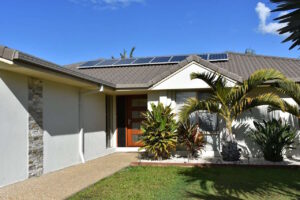The emissions intensity of Australia’s gas sector is getting worse according to new analysis, raising fresh questions around the Morrison government’s claims that Australia’s gas exports are reducing global emissions even as it pushes Australia’s own emissions higher.
Detailed in a new briefing paper published by the Institute for Energy Economics and Financial Analysis (IEEFA), the level of emissions caused by Australia’s gas industry is increasing, as projects expand into more emissions intensive gas reserves.
“Since 2014, the 360% expansion of LNG production in Australia accompanies a likely 460% growth in the industry’s domestic greenhouse gas emissions,” IEEFA analyst John Robert says.
“The LNG industry is not as clear in its reporting of emissions as say, the electricity industry. Untangling the web requires a very big deep dive.”
The analysis again raises questions about the Morrison government’s claims that the grow of Australia’s gas industry and LNG exports is leading to overall reductions in global greenhouse gas emissions, and also questions the ability of gas to serve as a transitional energy source.
IEEFA estimates that between 2014 and 2019, the emissions intensity of Australia’s gas production had increased by around 30 per cent as newer projects released higher rates of greenhouse gas emissions.
This saw the average amount of greenhouse gas emissions associated with gas production increase from 0.54 tonnes of CO2-e per tonne of LNG produced, to 0.70 tonnes of CO2-e per tonne of LNG produced.
This increase reduces the difference in emissions between coal and gas as alternative fuels, suggesting there are diminishing benefits to using gas as a transition fuel.
With the gas industry increasing production by more than three-fold over the last five years, greenhouse emissions from the sector were disproportionately higher, approaching an almost five-fold increase.
The research institute highlighted that the increases in Australia’s gas emissions had effectively nullified the emissions reductions achieved in other parts of the Australian economy, particularly the electricity sector which had been driven by increased adoption of renewables.
The Victorian state government recently lifted a moratorium on onshore gas exploration, which was immediately met with criticisms that the government had both overestimated the economic benefits of the gas industry, while significantly underestimating the emissions that it would cause.
IEEFA adds that it is unacceptable that LNG projects were still undertaking the practice of venting methane and carbon dioxide, given both their contributions to global warming and the amount of funding governments had poured into carbon capture and storage technologies.
“Inadvertent or unintended emissions of methane could correctly be called fugitive, but they are generally very small in the conventional, non-coal seam gas-based LNG industry compared to both necessary and deliberate CO2 venting,” Robert says.
“With all the billions spent researching carbon capture and storage (CCS) over the last two decades it should be unacceptable to vent concentrated CO2 into the atmosphere and call it fugitive.”
IEEFA says that given a significant number of new Australian gas developments have been paused as a result of the Covid-19 related disruptions, now is an ideal time to reconsider the need for further expansion of the gas industry.
“This pause gives time for a new look at what is happening in the LNG industry,” Robert added. “We must better quantify the very high level of emissions being released, and potentially to be released in even higher proportions, from new developments over several more decades.”
IEEFA says that compared to other countries, Australia had largely wasted the economic benefits that growing the gas industry could have delivered.
This was particularly due to the approach taken by Australian governments that was largely hands-off, taking little direct financial interest in projects and imposing minimal taxation.
IEEFA points to countries like Qatar, Papua New Guinea and the United States, that either have higher public ownership of gas producers or impose effective licencing regimes.
“They are thus able to extract substantial and equitable returns to the national estate on behalf of its citizens,” Robert says.
“By contrast, the extreme ‘laissez-faire’ regime in Australia has not served the nation’s interests in either financial returns or in clarity about limiting this industry’s emissions.”
Gas companies have put a number of huge projects on hold as the global economy deals with the disruption caused by Covid-19. Major Australia producer Woodside petroleum has shelved more than $50 billion worth of projects, which was followed by similar announcements by Exxon which has paused activities in Bass Strait and Origin Energy which has announced a halt to its plans to expand fracking activities into the Northern Territory.
International gas prices have also taken a significant hit, as a result of a recent oil price war between Russia and OPEC states. With much of the Asian gas market pegged to the international oil price, gas prices followed oil to fall to record lows.
RenewEconomy and its sister sites One Step Off The Grid and The Driven will continue to publish throughout the Covid-19 crisis, posting good news about technology and project development, and holding government, regulators and business to account. But as the conference market evaporates, and some advertisers pull in their budgets, readers can help by making a voluntary donation here to help ensure we can continue to offer the service free of charge and to as wide an audience as possible. Thankyou for your support.










